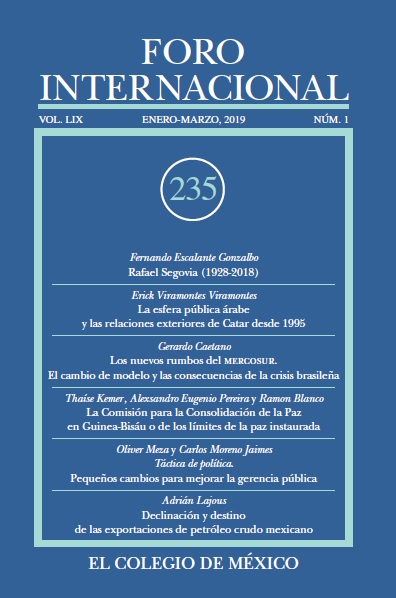The Arab public sphere and Qatari foreign relations since 1995
DOI:
https://doi.org/10.24201/fi.v59i1.2481Keywords:
Qatar, Foreign relations, Arab public sphere, Al Thani, Middle EastAbstract
According to the most recent perspectives on the foreign policy of the Arab States, this article argues that certain intriguing features of Qatar's foreign relations since the mid-1990s are proof of the influence of the Arab public sphere in decision-making by this State, as they demonstrate the attempts of the Qatari leadership to position itself in that public sphere through initiatives that hold great symbolic value. Based on an analysis of media reports and interviews with the principal leaders of Qatar by internationally recognized media outlets, this research makes a contribution to the debates on diplomacy in the Middle East and expands the Spanish-language bibliography on a State whose importance has increased considerably in the first two decades of the current century.
Downloads
References
Al-Thani, Tamim bin Hamad, “Qatar’s Message to Obama”, The New York Times, 24 de febrero de 2015, en https://www.nytimes.com/2015
Barakat, Sultan, Qatari Mediation: Between Ambition and Achievement, Washington, DC, Brookings Institution, 2014. (Brookings Doha Center Analysis Paper, núm. 12).
Barnett, Michael, Dialogues in Arab Politics: Negotiations in Regional Order, Nueva York, Columbia University Press, 1998.
“Bush Al-Jazeera «Plot» Dismissed”, BBC News, 22 de noviembre de 2005, en http://news.bbc.co.uk/2/hi/uk_news/politics/4459296.stm
Calhoun, Craig (ed.), Habermas and the Public Sphere, Cambridge, The MIT Press, 1992.
Dargin, Justin, “Qatar’s Natural Gas: The Foreign Policy Driver”, Middle East Policy, 14 (2007), núm. 3, pp. 136-142.
Dickson, Martin y Roula Khalaf, “Interview Transcript: Sheikh Hamad, Emir of Qatar”, The Financial Times, 24 de octubre de 2010.
Eickelman, Dale F. y Jon W. Anderson, New Media in the Muslim World: The Emerging Public Sphere, Bloomington-Indianapolis, Indiana University Press, 1999.
Gause, Gregory, The International Relations of the Persian Gulf, Cambridge, University Press, 2010.
Goodenough, Patrick, “Kerry in 2009: Qatar Can’t Be American Ally on Monday that Sends Money to Hamas on Tuesday”, CNS News, 1 de agosto de 2014, en https://www.cnsnews.com/news
Gray, Matthew, Qatar: Politics and the Challenges of Development, Boulder, Lynne-Rienner, 2013.
Habermas, Jürgen, The Structural Transformation of the Public Sphere: An Inquiry into a Category of Bourgeois Society, trad. de T. Burger, Cambridge, MIT Press, 1991.
Hinnebush, Raymond y Anoushiravan Ehteshami (eds.), The Foreign Policies of Middle East States, Londres, Lynne-Rienner, 2002.
Kamrava, Mehran, “Royal Factionalism and Political Liberalization in Qatar”, The Middle East Journal, 63 (2009), pp. 401-420.
Kamrava, Mehran, “Mediation and Qatari Foreign Policy”, The Middle East Journal, 65 (2011), pp. 539-556.
Kamrava, Mehran, Qatar: Small State, Big Politics, Ithaca, Cornell University Press, 2013.
Kawakibi, Salam, “Al-Yazira y la política exterior de Qatar”, Awraq. Revista de Análisis y Pensamiento sobre el Mundo Árabe e Islámico Contemporáneo, 2010, núm. 2, pp. 61-78.
Khalaf, Roula y Abigail Fielding-Smith, “How Qatar Seized Control of the Syrian Revolution”, The Financial Times, 17 de mayo de 2013, en https://www.ft.com/content/, consultado el 27.VII.2017.
Khalidi, Rashid, “The Origins of Arab Nationalism: Introduction”, en Rashid Khalidi, Lisa Anderson, Muhammad Muslih y Reeva S. Simon (eds.), The Origins of Arab Nationalism, Nueva York, Columbia University Press, 1991.
Korany, Bahgat y Ali E. Hilal Dessouki (eds.), The Foreign Policies of Arab States: The Challenge of Globalization, Cairo, The American University in Cairo Press, 2008.
Lynch, Marc, “Jordan’s Identity and Interests”, en Shibley Telhami y Michael Barnett (eds.), Identity and Foreign Policy in the Middle East, Ithaca, Cornell University Press, 2002.
Lynch, Marc, Voices of the New Arab Public: Iraq, Al Jazeera, and Middle East Politics Today, Nueva York, Columbia University Press, 2007.
Maguire, Kevin y Andy Lines, “Exclusive: Bush Plot to Bomb His Arab Ally”, The Daily Mirror, 22 de noviembre de 2005, en http://www.mirror.co.uk/news/
Miles, Hugh, Al-Jazeera: The Inside Story of the Arab News Channel that is Challenging the West, Nueva York, Grove Press, 2005.
Onley, James, The Arabian frontier of the British Raj: Merchants, Rulers, and the British in the Nineteen-Century Gulf, Nueva York, Oxford University Press, 2007.
Patel, David Siddharta, “Repartitioning the Sykes-Picot Middle East? Debunking Three Myths”, Middle East Brief, 2016, núm. 103, pp. 1-10.
Peterson, J. E., “Qatar and the World: Branding for a Micro-State”, The Middle East Journal, 60 (2006), pp. 732-748.
Podeh, Elie, The Decline of Arab Unity: The Rise and Fall of the United Arab Republic, Sussex, Academic Press, 1999.
Priego, Alberto, “Las Primaveras Árabes: la influencia de Qatar y sus relaciones con los estados del Golfo”, Revista UNISCI, 2015, núm. 39, pp. 233-252.
Provence, Michael, The Great Syrian Revolt and the Rise of Arab Nationalism, Austin, University of Texas Press, 2005.
“Qatari FM Denies Reports on Meshaal Departure from Doha”, Kuwait News Agency, 12 de enero de 2015.
“Qatari Premier Calls for «Clear-Cut» Stand on Israeli «Aggression»”, BBC Monitoring Middle East, 13 de enero de 2009.
Rabi, Uzi, “Qatar’s Relations with Israel: Challenging Arab and Gulf Norms”, The Middle East Journal, 63 (2009), pp. 443-459.
Sheehi, Stephen, Foundations of Modern Arab Identity, Gainesville, University Press of Florida, 2004.
Sherwood, Harriet, “Palestine Papers Provoke Anger on Streets of West Bank and Gaza”, The Guardian, 25 de enero de 2011, en https://www.theguardian.com/world/2011
Soage, Ana Belén, “Shaykh Yusuf al-Qaradawi: Portrait of a Leading Islamic Cleric”, Middle East Review of International Affairs, 12 (2008), pp. 51-68.
Solomon, Jay y Nour Malas, “Qatar’s Ties to Militants Strain Alliance”, The Wall Street Journal, 23 de febrero 2015, en https://www.wsj.com/articles
State of Qatar, “Statement before the 60th Session of the General Assembly of the United Nations”, Nueva York, 19 de septiembre de 2005.
Telhami, Shibley y Michael Barnett (eds.), Identity and Foreign Policy in the Middle East, Ithaca, Cornell University Press, 2002.
“Uae Summons Qatari Ambassador over Cleric’s Comments”, Arabian Business.Com, 2 de febrero de 2014.
Ulrichsen, Kristian Coates, Qatar and the Arab Spring, Londres, Hurst & Co Publishers, 2014.
Ulrichsen, Kristian Coates, The Gulf States in International Political Economy, Nueva York, Palgrave Macmillan, 2016.
Woertz, Eckart, “Qatar y el descuido europeo de la región del Golfo Pérsico”, Notes Internationals CIDOB, 2012, núm. 46, pp. 1-6.













